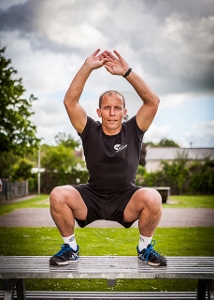Main Menu
Latest Blog Entry
User login
How can I improve my vertical jump performance? Diary of an intern
By Fran Low
In my last post I reflected on the numerous aspects of coaching and the importance of focussing on overall development as a coach. Some of these aspects include improving technical knowledge regarding training and maximising performance, integrating knowledge from different areas to find effective solutions to training problems and learning how and when to apply these principles when coaching.
During my recent coaching experiences with Excelsior, I have certainly begun to increase my understanding in each of the different areas of coaching.
Coaching Tools-
A coaching session at Millfield School last week provided a perfect opportunity for me to add to my technical knowledge, with a new tool for the coaching toolbox. When an athlete asked James “How can I improve my Vertical Jump performance” I immediately thought of various exercises including squats, jumps and plyometrics. However with so many exercises and protocols available, which are the most effective?
The practice which James demonstrated in fact included a number of different exercises. By using a combination of isometric and dynamic movements, James explained how you can first optimise recruitment of many fast twitch muscle fibres before performing the more powerful movements which benefit from the activation of these muscle fibres.
This experience has highlighted the importance of integrating knowledge of different disciplines when selecting training methods rather than just selecting an exercise which replicates the movement pattern of the skill. By analysing the physiological processes which occur during an exercise or exercises, you can begin to determine the most effective way of achieving the desired outcome.
Adapting Coaching-
However none of this knowledge is of any use without being able to apply it correctly and deliver appropriate information to the athletes.
One very valuable lesson I have begun to learn through my experiences observing James so far is the ability to adapt a coaching session to suit the athlete or athletes involved.
This can include reducing the intensity of a session to ensure a tired athlete is not overworked, mixing up the order of exercises to keep sessions fresh and challenging for the athletes and varying the difficulty of exercises depending on the skill level of the athletes.
 However in addition to making subtle modifications to a session plan, it is also occasionally necessary to change a session completely in order to ensure that athletes can successfully master a skill.
However in addition to making subtle modifications to a session plan, it is also occasionally necessary to change a session completely in order to ensure that athletes can successfully master a skill.
A good example of this occurred during a coaching session with some young athletes, who were asked to complete a series of medicine ball exercises.
However, the first movement was an overhead squat which none of the athletes managed to perform correctly. Rather than move on to the next exercise, James stopped the session and put the athletes through an overhead squat master class.
By the end of the session all of the athletes had improved their technique dramatically, and all understood their targets for improvement. This is a vital lesson in the difference between coaching and just instructing a series of exercises, and is vital to ensure athletes stay fit and healthy.
If you want to learn more, please come on one of our strength and conditioning courses.
Client Testimonials
 Paul Mitchell Golf Academy
Paul Mitchell Golf Academy
With twenty plus years golf coaching experience working with all levels of golfer, I have sought after specific physical training for my more elite players. In this quest, I have worked alongside trainers who have worked with the very best golfers in the world. I can hand on heart say that James is the […]
More

